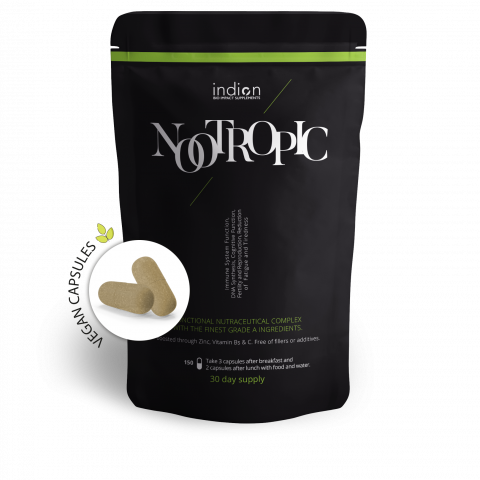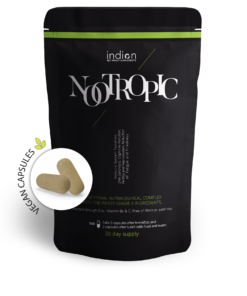An Introduction to the Topic and Explanation of Smart Drugs
In our fast-paced, highly competitive society, we are constantly seeking ways to improve our performance, whether it be in academics or professional endeavors. In recent years, smart drugs have emerged as a popular solution for enhancing cognitive function.
But what exactly are smart drugs? Smart drugs, also known as nootropics or cognitive enhancers, are substances that can improve mental processes such as memory, attention span, and concentration.
They have gained popularity among students looking for an edge in exams and professionals seeking improved productivity. Some common examples of smart drugs include Modafinil, Adderall, and Ritalin.
Brief Overview of the Topic
The use of smart drugs has become increasingly prevalent in today’s society due to their potential benefits for improving cognitive function. However, the use of these substances also raises ethical concerns about fairness and safety concerns about long-term effects on brain health. As greater numbers of people turn towards these cognitive enhancers as a means of gaining a competitive edge in their personal or professional lives, it is important to understand what they are and how they work.
Thesis Statement
The purpose of this article is to analyze the effectiveness of smart drugs in improving cognitive function while also examining ethical concerns associated with their usage. Through detailed research and analysis on anecdotal evidence from individuals who have used them before , we hope to provide a comprehensive overview on this increasingly popular topic.
What are smart drugs?
Smart drugs, also known as nootropics, are substances that enhance cognitive function in healthy individuals. These substances are designed to improve memory, focus, attention, and motivation. They work by influencing the brain’s neurotransmitters – chemical messengers that communicate information between neurons.
Nootropics come in a variety of forms including pills, powders, and drinks. Some of these substances are natural compounds found in food such as caffeine and omega-3 fatty acids while others are synthetic compounds specifically formulated for cognitive enhancement.
Definition and types of smart drugs
The term “smart drugs” is often used interchangeably with “nootropics”. Nootropics can be classified into two main categories: prescription and over-the-counter (OTC) nootropics. Prescription nootropics can only be obtained with a doctor’s prescription whereas OTC nootropics can be purchased without a prescription from online retailers or health stores.
Prescription nootropics include drugs such as Modafinil which is used to treat narcolepsy and shift work sleep disorder. Other prescription nootropics include Adderall which is commonly prescribed for Attention Deficit Hyperactivity Disorder (ADHD) and Ritalin which is used to treat both ADHD and narcolepsy.
How they work in the brain
Nootropic substances work by influencing the levels or activity of neurotransmitters such as dopamine, acetylcholine, serotonin, norepinephrine or glutamate. For example, Modafinil increases dopamine levels in the brain which promotes wakefulness and alertness. Other nootropic compounds may enhance the release of acetylcholine which plays an important role in memory formation and learning.
Most nootropics work by altering the brain’s supply or use of neurotransmitters, by blocking receptors, or by modulating enzymes that control the metabolism of neurotransmitters. These effects can lead to improved cognitive function such as better focus, memory recall, and learning capabilities.
Examples of popular smart drugs
Some popular nootropics include caffeine which is a natural stimulant found in coffee and tea that can help improve focus and alertness. Other natural substances include Ginkgo Biloba which is believed to improve blood flow to the brain, Bacopa Monnieri which is used in Ayurvedic medicine for memory enhancement and L-Theanine which is found in green tea and can reduce anxiety while improving attention span. In terms of synthetic compounds, Modafinil is a popular prescription nootropic that promotes wakefulness.
Piracetam is another well-known nootropic compound that has been used since the 1970s as a cognitive enhancer. Other synthetic compounds include Aniracetam, Oxiracetam, Pramiracetam, Phenylpiracetam amongst others.
The Cognitive Enhancement Debate
The use of smart drugs for cognitive enhancement is a hotly debated topic. While some argue that they can increase productivity and improve overall cognitive performance, others believe that using such substances is unethical and can have negative long-term effects on the brain.
There have been several research studies conducted on smart drugs and their impact on cognitive function, which have yielded mixed results. Some studies have shown improvements in memory and focus, while others have highlighted potential side effects.
Research Studies on Smart Drugs
Several studies have been conducted to explore the effects of smart drugs on cognitive function. One study published in the Journal of Psychopharmacology found that modafinil, a popular smart drug, significantly improved attention and working memory in healthy individuals. Another study published in PLoS One found that caffeine had a positive effect on long-term memory consolidation.
However, not all studies have shown positive results. A study published in Human Psychopharmacology: Clinical and Experimental found that while methylphenidate (another commonly used smart drug) improved sustained attention and response inhibition, it did not enhance other aspects of cognition such as working memory or verbal learning.
Benefits vs Drawbacks
Like any substance or medication, there are both benefits and drawbacks to using smart drugs for cognitive enhancement. The primary benefit is improved memory and focus, which can lead to increased productivity and performance at work or school.
However, there are also potential side effects associated with these substances such as headaches, anxiety, insomnia, and addiction. Another significant drawback is the ethical concern around using substances for cognitive enhancement purposes.
Some argue that it creates an unfair advantage for those who use them compared to those who do not – especially if they are used in academic or professional settings where competition is high. Overall, research studies suggest mixed results when it comes to the effectiveness of smart drugs for cognitive enhancement.
While some substances may increase memory and focus, they also come with potential side effects and raise significant ethical concerns. It is important to weigh the pros and cons carefully before considering using these substances for cognitive enhancement purposes.
The Use of Nootropics in Professional Sports
Over the years, there has been a growing trend of athletes using smart drugs in an attempt to gain a competitive edge. This has led to several high-profile cases of athletes being caught and punished for the use of these substances. However, the use of nootropics is still prevalent in many professional sports.
Some athletes claim that nootropics help them improve their focus and mental clarity, which can be crucial in high-pressure situations. However, there is little scientific evidence to support these claims.
In fact, some studies suggest that nootropics may actually impair athletic performance by reducing reaction time and increasing anxiety. Another concern with the use of nootropics in professional sports is the potential health risks associated with long-term use.
Many smart drugs have not been extensively tested for safety or efficacy, and their long-term effects on the body are largely unknown. Additionally, there is always a risk of addiction or dependency when using any substance to enhance performance.
NOOTROPIC BLEND
Konzentration, Fokus, Kreativität
NOOTROPIC BLEND wurde zur Steigerung von Konzentration, Aufmerksamkeit und Reaktionsfähigkeit entwickelt. Für den Moment, in dem du es brauchst.
- Kreativität im Beruf
- Fokus beim Lernen
- Konzentration bei Wettkämpfen
- Antioxidantien zum Schutz für das Gehirn
- 2 Kapseln täglich, 30 Minuten vor Arbeit, Wettkampf, Training oder Prüfung
The Impact of Long-Term Use on Brain Health
While short-term use of smart drugs may improve cognitive function, there are concerns about the impact of long-term use on brain health. Some studies suggest that prolonged use of certain nootropics can cause damage to brain cells and impair cognitive function over time.
One substance that has been linked to potential long-term damage is modafinil – a popular smart drug used to treat sleep disorders and improve wakefulness. Although it has been deemed safe for short-term use by many regulatory bodies such as FDA, many experts caution against prolonged or excessive consumption as it may cause serious side-effects like skin rashes, depression etc.
More research is needed to fully understand the long-term effects of smart drug use on brain health. In the meantime, it’s important for individuals to weigh the potential benefits and risks before deciding whether to use these substances.
Smart Drug Addiction
As with any substance that alters brain chemistry, there is a risk of addiction or dependency when using smart drugs. Some people may become reliant on these substances to function at their best, and may experience withdrawal symptoms if they try to stop using them.
Additionally, some individuals may develop a psychological dependence on smart drugs as a means of coping with stress or anxiety. This can lead to a cycle of dependence that can be difficult to break without professional help.
It’s important for individuals who are considering using smart drugs to be aware of the potential risks and take steps to minimize their chances of developing an addiction. This includes following dosage guidelines carefully and seeking help if they experience any adverse effects.
Rarely known small details about the topic
Legal status and regulation of smart drugs in different countries
The legal status of smart drugs varies greatly across different countries. While some countries have banned the use and sale of these drugs, others have placed restrictions on their availability. In the United States, for example, many smart drugs are classified as prescription medications and are only available with a doctor’s prescription.
On the other hand, in some countries like Mexico and India, many smart drugs can be purchased over-the-counter without a prescription. In addition to differing legal statuses, there is also a lack of clear regulations surrounding smart drug use.
This makes it difficult for consumers to know exactly what they are buying and what potential side effects or risks may be involved. As such, it is important for individuals who choose to use smart drugs to do their own research beforehand and consult with medical professionals.
Emerging research on new types of smart drugs
As technology continues to advance, researchers are constantly discovering new types of smart drugs that can enhance cognitive function. One promising area of research involves “nootropic peptides,” which are small proteins that can improve memory retention and learning abilities. Another area of research involves “smart foods,” which are foods that contain natural compounds that can boost brain function.
Despite the potential benefits of these emerging types of smart drugs, it is important to note that they may not be fully understood or regulated yet. Consumers should proceed with caution when considering using them and stay up-to-date on any new safety information or potential risks.
Personal anecdotes from individuals who have used or experimented with smart drugs
There is no shortage of personal anecdotes from individuals who have used or experimented with different types of smart drugs. Some users report increased focus and productivity while taking these substances, while others claim negative side effects such as anxiety and insomnia. However, it is important to note that personal anecdotes should not be taken as scientific evidence.
Each individual’s experience with smart drugs can vary greatly, and more research is needed to fully understand the effects of these substances on cognitive function and overall health. As such, it is important for individuals who choose to use smart drugs to approach them with caution and carefully monitor any potential side effects or risks.
Conclusion
After examining the various aspects of smart drugs and their effects on cognitive function, it is clear that there are both benefits and drawbacks to their use. While research has shown that certain smart drugs can improve memory and focus, there are also potential side effects and ethical concerns to consider. As such, it is important for individuals to weigh the risks and benefits before deciding whether or not to use smart drugs for cognitive enhancement.
Furthermore, the use of smart drugs has implications beyond the individual level. The emergence of nootropics in professional sports raises questions about fair play and athlete safety, while the impact of long-term use on brain health is still being studied.
Additionally, with new types of smart drugs constantly being developed, it will be important for policymakers to regulate these substances appropriately. Despite these concerns, the potential for smart drugs to improve cognitive function cannot be ignored.
With further research, it may be possible to develop safe and effective smart drugs that can benefit individuals without causing harm. The field of cognitive enhancement is constantly evolving, and it will be interesting to see what new developments arise in the coming years.
While we must proceed with caution when it comes to using smart drugs for cognitive enhancement, we should not dismiss their potential entirely. With responsible use and continued research into their effects on the brain, they could offer a promising tool for improving our mental abilities in an increasingly competitive world.
Das sagen unsere Kunden:
“Since incorporating NOOTROPIC BLEND into my daily routine, I feel more mentally alert and can focus longer. It helped me work more efficiently and improve my memory. A great product that I would recommend to anyone looking to boost their cognitive performance!”
Laura M., Project Manager
“NOOTROPIC BLEND is a real gamechanger for me. As an entrepreneur, I am constantly looking for ways to boost my mental performance and this product did not disappoint. Since I have been taking it regularly, I have noticed a significant increase in my creativity and problem solving skills. I highly recommend it!”
Markus S., entrepreneur
“As a student, I often have trouble focusing on my study materials for long periods of time. With NOOTROPIC BLEND I could noticeably improve my concentration and receptivity. Now I learn faster and retain what I have learned better in my memory. I am very pleased with this product and will continue to use it!”
Julia K., student
NOOTROPIC BLEND
Konzentration, Fokus, Kreativität
NOOTROPIC BLEND wurde zur Steigerung von Konzentration, Aufmerksamkeit und Reaktionsfähigkeit entwickelt. Für den Moment, in dem du es brauchst.
- Kreativität im Beruf
- Fokus beim Lernen
- Konzentration bei Wettkämpfen
- Antioxidantien zum Schutz für das Gehirn
- 2 Kapseln täglich, 30 Minuten vor Arbeit, Wettkampf, Training oder Prüfung
Frequently asked questions and answers FAQ
What is cognitive performance?
Cognitive performance refers to the brain’s ability to process, store, and retrieve information. It includes various mental skills such as attention, perception, memory, language, problem solving, and decision making.
What factors influence cognitive performance?
Biological, environmental, and personal factors influence cognitive performance. These include genetics, age, brain structure, education, socioeconomic status, diet, cultural influences, motivation, attitude, self-efficacy, and emotional well-being.
How can I increase my cognitive performance?
To increase cognitive performance, you can eat a healthy diet, get enough sleep, be physically active on a regular basis, do cognitive workouts, and practice relaxation techniques such as meditation, yoga, or breathing exercises.
What are the benefits of increased cognitive performance?
Increased cognitive performance can lead to better problem-solving ability, improved memory, increased creativity, and an overall better quality of life.
Can relaxation techniques improve cognitive performance?
Yes, relaxation techniques such as meditation, yoga and breathing exercises can help reduce stress and promote emotional well-being, which in turn can have a positive effect on cognitive performance.
Nutritional supplements
€59,90
Das könnte dich auch interessieren:
Nootropic Blend
Nootropics for Motivation
Ever felt like you’re stuck in a rut, unable to muster the energy or motivation [...]
Nootropic Blend
Nootropic Blend: best focus supplement for gaming
Discover the best nootropic blend for gaming! Our article explores the benefits, ingredients and factors [...]
Nootropic Blend
Neuroenhancement: brain doping?
Many people are looking for ways to increase their cognitive abilities and reach their full [...]
Nootropic Blend
Combat lack of concentration
Discover now the natural formula for more focus and productivity in everyday life. Increase concentration [...]
Nootropic Blend
Clearing the Brain Fog: How Nootropics can Enhance Cognitive Function and Boost Productivity
Discover how nootropics can help you tackle brain fog. Learn about the best types of [...]
Nootropic Blend
Navigating the World of Brain Boosting Nootropics: From Racetams to Rhodiola
Unlock your cognitive potential with brain-boosting nootropics. Learn about different types, benefits, and safe use [...]
Nootropic Blend
How ashwagandha effect muscles
Discover the effects of ashwagandha on muscle health. Learn how this adaptogenic herb can enhance [...]








